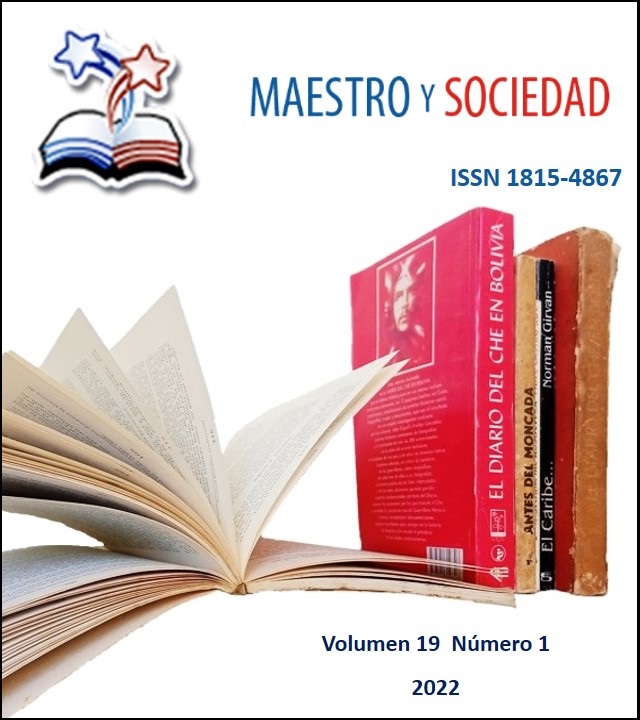Array Array
Array
Palavras-chave:
Array, ArrayResumo
ArrayReferências
2. Cadena, D., Macías, G., Alcívar, M., Mendoza, E., & Maldonado, J. (2018). Innovación – emprendimiento y competitividad en microempresas del cantón Quevedo. Ciencia & Tecnología, 18(20): 79 - 87, https://doi.org/10.47189/rcct.v18i20.225.
3. Campelo, M. A. (2020). Identidad cultural montubia como aporte al etnoturismo en el cantón Vinces. Obtenido de Universidad Técnica de Babahoyo: http://dspace.utb.edu.ec/handle/49000/7542
4. Cañarte-Quimis, Marcillo-Marcillo, Leones-Pico, & Márquez-Toala. (2020). El emprendimiento como estrategia o necesidad en el desarrollo productivo de Ecuador. Ciencias económicas y Empresariales,5(4), 72-90, https://doi.org/10.23857/fipcaec.v5i4.297.
5. Castellano, J., Carrera, R., & Crespo, W. (2020). Educación on line en tiempos de COVID-19: percepción en estudiantes de la Universidad Católica de Cuenca (Ecuador). Revista de Historia, Patrimonio, Arqueología y Antropología Americana,3:149-175, https://doi.org/10.5281/zenodo.4066073.
6. Cordero, J., Astudillo, S., Carpio, X., Delgado, J., & Amón-Martínez. (2011). Análisis de los factores que influyen el emprendimiento y la sostenibilidad de las empresas del área urbana de la ciudad de Cuenca, Ecuador. Maskana,2(2): 27-37, https://doi.org/10.18537/mskn.02.02.03.
7. Gobierno Autonomo Descentralizado municipal del cantón Sucre. (2019). Recuperado el 27 de 05 de 2020, de http://app.sni.gob.ec/sni-link/sni/PORTAL_SNI/data_sigad_plus/sigadplusdocumentofinal/sucre.pdf
8. Lemoine, F., Chica, C. E., Villacis, L., & Meneses, W. (2020). Las viviendas de interés patrimonial como instrumento para el fortalecimiento de la actividad turística de la Bahía de Caraquez (Ecuador). Revista Internacional de Turismo, Empresa y Terriotorio,4(2):194-211, https://doi.org/10.21071/riturem.v4i2.12926.
9. Mesías, R. (2017). Situación del emprendimiento y sus alcances en el Ecuador. European Scientific Journal,13(13): 229-239, http://dx.doi.org/10.19044/esj.2017.v13n13p229.
10. MinEdu. (2020). Ecuador mejoró su sistema educativo en los últimos 7 años. Obtenido de http://www.ineval.gob.ec/index.php/Terce-informes
11. O.M.T. (13 de 12 de 2019). Organización Mundial de Turismo. Obtenido de https://www.unwto.org/es/preserving-cultural-identities-for-the-future-of-tourism
12. Proaño Castro, M. F. (2021). EMPRENDIMIENTO FEMENINO EN PANDEMIA. UNA REALIDAD EN LAS MUJERES DE LA ZONA NOROESTE REALIDAD EN LAS MUJERES DE LA ZONA NOROESTE. Publicando,8 (31): 117- 127, https://doi.org/10.51528/.
13. Ramón, S., Bustamante, V., Obando, O., Saltos, N., & Cabrera, E. (2018). EL EMPRENDIMIENTO: UN RETO PARA LOS ESTUDIANTES UNIVERSITARIOS EN LA CONTEMPORANEIDAD. Cognosis,3(4):1-12, https://doi.org/10.33936/cognosis.v3i4.1553.
14. Rivera, C. G., Espinosa, J., & Valdés, Y. (2017). La investigación científica en las universidades ecuatorianas. Prioridad del sistema educativo vigente. Revista Cubana Educación Superior, 36(2):113-125.
15. Valencia, L. (2017). Emprendimiento en Ecuador. Estudio de Caso: Provincia de Santa Elena. Revista Killkana Sociales,1( 2): 27-32, https://doi.org/10.26871/killkanasocial.v5i1.
16. Velez, A. G. (2018). La Etnia Montubia como parte de la identidad de los habitantes de las comunidades de las Parroquias urbanas y rurales del cantón Portoviejo, Provincia de Manabí. Obtenido de https://core.ac.uk/reader/160796699
17. Vernaza, G., Medina, E., & Chamorro, J. (2020). Innovación, emprendimiento e investigación científica. Revista de Ciencias Sociales,26(3): , https://doi.org/10.31876/rcs.v27i3.
18. Villacis, L., Jácome, L., Lemoine, F., & Zambrano, J. A. (2021). La nueva generación receptora de la identidad de pueblo. CentroSur Editorial,5(3):81–89, https://doi.org/10.37955/cs.v5i1.101.
19. Villacis, Lilia, Espinoza, M., Meneses, W., & Macías, J. R. (2021). La consonancia de la cultura montubia, para mantener las tradiciones de los pueblos manabitas. CentroSur Editorial,5(1): 71–80., https://doi.org/10.37955/cs.v5i1.100.
Publicado
Como Citar
Edição
Seção
Licença
Esta revista proporciona un acceso abierto inmediato a su contenido, basado en el principio de que ofrecer al público un acceso libre a las investigaciones ayuda a un mayor intercambio global de conocimiento. Cada autor es responsable del contenido de cada uno de sus artículos. Los artículos pueden ser inéditos o estar disponibles previamente en servidores de preprints reconocidos por la revista. Sin embargo, no se permite la duplicación de la publicación o traducción de un artículo ya publicado en otra revista o como capítulo de un libro.
This journal provides immediate open access to its content, based on the principle that providing the public with free access to research supports a greater global exchange of knowledge. Each author is responsible for the content of each of their articles. Articles may be previously unpublished or available on preprint servers recognized by the journal. However, duplication of publication or translation of an article already published in another journal or as a book chapter is not permitted.
Esta revista oferece acesso aberto imediato ao seu conteúdo, com base no princípio de que oferecer ao público acesso gratuito à pesquisa contribui para um maior intercâmbio global de conhecimento. Cada autor é responsável pelo conteúdo de cada um de seus artigos. Os artigos poderão ser inéditos ou estar previamente disponíveis em servidores de preprints reconhecidos pela revista. No entanto, não é permitida a duplicação de publicação ou tradução de artigo já publicado em outro periódico ou como capítulo de livro.



























 Universidad de Oriente
Universidad de Oriente 